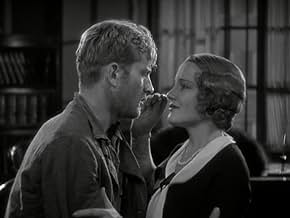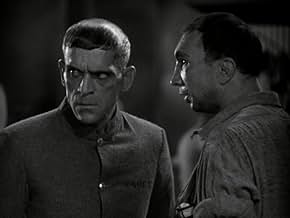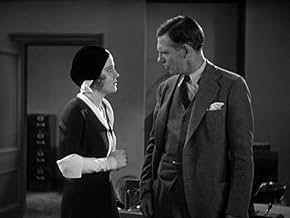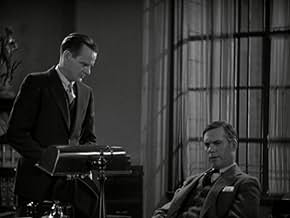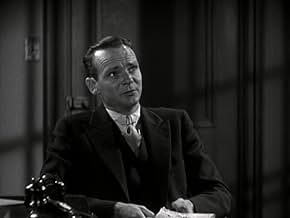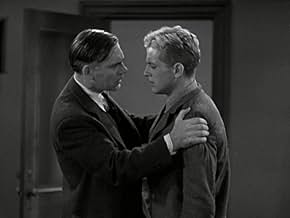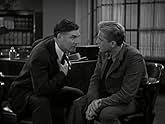VALUTAZIONE IMDb
6,9/10
1537
LA TUA VALUTAZIONE
Aggiungi una trama nella tua linguaAfter a failed attempt at running for governor, D.A. Mark Brady is appointed warden of the state prison where many of the criminals he prosecuted are incarcerated.After a failed attempt at running for governor, D.A. Mark Brady is appointed warden of the state prison where many of the criminals he prosecuted are incarcerated.After a failed attempt at running for governor, D.A. Mark Brady is appointed warden of the state prison where many of the criminals he prosecuted are incarcerated.
- Regia
- Sceneggiatura
- Star
- Candidato a 1 Oscar
- 3 vittorie e 1 candidatura in totale
DeWitt Jennings
- Captain Gleason
- (as De Witt Jennings)
Paul Porcasi
- Tony Spelvin
- (as Paul Porcassi)
Richard Bishop
- Minor Role
- (non citato nei titoli originali)
Andy Devine
- Cluck - a Convict with knife
- (non citato nei titoli originali)
James Guilfoyle
- Detective Doran
- (non citato nei titoli originali)
Frank Hagney
- Prison Guard in Yard
- (partecipazione non confermata)
- (non citato nei titoli originali)
Recensioni in evidenza
Robert Graham (Phillips Holmes) accidentally kills a man and is imprisoned for manslaughter. Some years later, the district attorney who - applying the criminal code verbatim - had got him into jail (Walter Huston) becomes prison warden and tries to rehabilitate him. That turns out to be hard because Graham has meanwhile learned another kind of criminal code: the values and standards that govern the behaviour of the prisoners. This is a well-intentioned film that is critical of the way the US prison system was run. It tells a good story and manages to generate a lot of suspense. The pacing is good, too - the thing gets never dull. There is even a bit of a romance, though this plays a rather minor role. I found the quality of the acting somewhat mixed. Huston, Holmes and Boris Karloff (who plays another prisoner) are doing very well, Constance Cummings (Huston's daughter and Holmes love interest) less so: At least in some scenes, she appeared rather wooden and stiff. What I found disappointing is the quality of the dialogue. Huston's default answer to almost anything he is told seems to be 'oh yeah?!' (a few years later - in 'It Happened One Night', 1934 - Clark Gable would make fun of dialogues that consisted of nothing but 'oh yeah?!'s). Whoever wrote the dialogues for 'The Criminal Code' did this otherwise good film no service.
Twenty year-old Robert Graham (Phillips Holmes) accidentally kills another man in a drunken brawl. District Attorney Mark Brady (Walter Huston) has to prosecute the young man, despite feeling sympathetic towards him. Graham is convicted to ten years in the state penitentiary. Six years later, D.A. Brady has been appointed warden of the prison and is appalled at what prison life has done to Graham. With help from his daughter (Constance Cummings), who falls in love with Graham, Brady gets the young man back on the right track. But all of it may come to naught when another prisoner is murdered and Graham is forced to choose between snitching and keeping quiet.
Phillips Holmes is not a name that most people, including myself, are familiar with. He retired from acting in 1938 and died in a mid-air collision in Canada four years later. This is probably his most well-known role and that's not saying much since this is hardly a well-known film. But he does a terrific job. Expectedly good performance from Walter Huston, arguably Hollywood's best actor in the early talkies. Also features Boris Karloff in one of his best pre-Frankenstein roles as a vengeful inmate who hates squealers.
Great early Howard Hawks crime drama. Nice Hawksian banter and overlapping dialogue, particularly in the early scenes with reporters. Remade twice, as Penitentiary in 1938 and Convicted in 1950. A must-see for fans of Hawks, Huston, and Karloff.
Phillips Holmes is not a name that most people, including myself, are familiar with. He retired from acting in 1938 and died in a mid-air collision in Canada four years later. This is probably his most well-known role and that's not saying much since this is hardly a well-known film. But he does a terrific job. Expectedly good performance from Walter Huston, arguably Hollywood's best actor in the early talkies. Also features Boris Karloff in one of his best pre-Frankenstein roles as a vengeful inmate who hates squealers.
Great early Howard Hawks crime drama. Nice Hawksian banter and overlapping dialogue, particularly in the early scenes with reporters. Remade twice, as Penitentiary in 1938 and Convicted in 1950. A must-see for fans of Hawks, Huston, and Karloff.
10whpratt1
Boris Karloff appeared on the stage of the Belasco Theatre, New York City in the role of Galloway in a Martin Flavin stage play. It was a minor part, however, it was an important one: Galloway, the prison trusty who becomes a killer. On the strength of his performance, he was soon cast in the film version. During 1931-32, twenty-three of his films were released, an average of nearly one a month which included Frankenstein. Criminal Code was the big break Karloff was waiting for and he never gave up acting until the very end.
In The Criminal Code the bywords of District Attorney Walter Huston is that where there is a crime, someone has to pay. Or if you can't do the time, don't do the crime as a later philosopher named Tony Baretta opined. And it's Huston's job to set the price when he prosecutes.
But Huston recognizes that young Phillips Holmes with a proper criminal defense attorney might do little time or even be acquitted. He smashed some poor guy's head in with a full bottle of bootleg hooch when he thought he was going for a gun. Still Holmes is convicted and he gets a ten year sentence.
Fast forward several years and Huston is no longer the District Attorney, he's now the warden of the prison that Holmes is incarcerated. Huston gives Holmes a chance and he makes him a trustee. Huston's daughter Constance Cummings even falls for Holmes.
But they have a different code among the convicts in prison and the biggest commandment is thou shalt not rat. When Boris Karloff does a particular rat in Holmes almost takes the fall for it because of that code.
The leads do a fine job in this, but the performances of Boris Karloff as the hardened convict and Clark Marshall as his victim really do stand out in The Criminal Code. Marshall especially, you can really feel his fear in his performance.
Beginning originally as a Broadway play, The Criminal Code was remade twice by Columbia Pictures, Harry Cohn not being one to let a good property go to waste. The two remakes are Penitentiary with Walter Connolly and John Howard and Convicted with Broderick Crawford and Glenn Ford.
The film holds up very well because the themes are eternal. Criminals have to pay the price when caught and rats are just as unpopular as ever.
But Huston recognizes that young Phillips Holmes with a proper criminal defense attorney might do little time or even be acquitted. He smashed some poor guy's head in with a full bottle of bootleg hooch when he thought he was going for a gun. Still Holmes is convicted and he gets a ten year sentence.
Fast forward several years and Huston is no longer the District Attorney, he's now the warden of the prison that Holmes is incarcerated. Huston gives Holmes a chance and he makes him a trustee. Huston's daughter Constance Cummings even falls for Holmes.
But they have a different code among the convicts in prison and the biggest commandment is thou shalt not rat. When Boris Karloff does a particular rat in Holmes almost takes the fall for it because of that code.
The leads do a fine job in this, but the performances of Boris Karloff as the hardened convict and Clark Marshall as his victim really do stand out in The Criminal Code. Marshall especially, you can really feel his fear in his performance.
Beginning originally as a Broadway play, The Criminal Code was remade twice by Columbia Pictures, Harry Cohn not being one to let a good property go to waste. The two remakes are Penitentiary with Walter Connolly and John Howard and Convicted with Broderick Crawford and Glenn Ford.
The film holds up very well because the themes are eternal. Criminals have to pay the price when caught and rats are just as unpopular as ever.
The lessons unlearned belong to Walter Huston's character, Mark Brady, but I'll get to that later.
Philip Holmes plays Robert Graham, a young man of twenty who gets into an altercation in a dance hall and ends up killing the other guy, someone he's never even met before. D.A. Mark Brady is not a man without compassion. He even states how, were he the defense attorney, he would get the boy off without serving a day. As a result, he sends him up for manslaughter rather than murder. However, that is still ten years, and six years into the sentence Graham is a man who is losing hope and his sanity.
In an odd twist of fate D.A. Mark Brady becomes warden of the prison, a place inhabited by many of the men he helped convict. The prison doctor comes to Brady with a request - let Graham be Brady's private driver for awhile, to get him out of the prison factory. Brady agrees. A few short months later and Graham is beginning to have a new lease in life. Plus, there is a complication - he is falling in love with Brady's daughter. However, an event soon occurs at the prison that threatens Graham's hope for a better future.
As for the lessons unlearned, the one quirky thing about this film is how D.A. turned prison warden Brady keeps saying "you've go to take things how they break", never realizing that in many cases - exhibit A being the case of inmate Robert Graham - Brady is in total control of how things break, in particular the fact that Robert Graham, a basically square kid, is an inmate in the first place. However, at least Brady is not a hypocrite, since he seems to be willing to take the good with the bad in his own life as well. A pretty complex character for an early 30's film.
Of course all classic movie fans are familiar with Walter Huston and his many abilities and roles. However, most people will not have heard of Philip Holmes. Partly this is because his early successes in film did not lead to better things as the 1930's progressed, and the rest of the reason is that many of his early successes occurred at Paramount, whose early films have been largely unseen for decades. This is worth checking out. The screenplay was nominated for an Oscar, and the performances are quite good.
Philip Holmes plays Robert Graham, a young man of twenty who gets into an altercation in a dance hall and ends up killing the other guy, someone he's never even met before. D.A. Mark Brady is not a man without compassion. He even states how, were he the defense attorney, he would get the boy off without serving a day. As a result, he sends him up for manslaughter rather than murder. However, that is still ten years, and six years into the sentence Graham is a man who is losing hope and his sanity.
In an odd twist of fate D.A. Mark Brady becomes warden of the prison, a place inhabited by many of the men he helped convict. The prison doctor comes to Brady with a request - let Graham be Brady's private driver for awhile, to get him out of the prison factory. Brady agrees. A few short months later and Graham is beginning to have a new lease in life. Plus, there is a complication - he is falling in love with Brady's daughter. However, an event soon occurs at the prison that threatens Graham's hope for a better future.
As for the lessons unlearned, the one quirky thing about this film is how D.A. turned prison warden Brady keeps saying "you've go to take things how they break", never realizing that in many cases - exhibit A being the case of inmate Robert Graham - Brady is in total control of how things break, in particular the fact that Robert Graham, a basically square kid, is an inmate in the first place. However, at least Brady is not a hypocrite, since he seems to be willing to take the good with the bad in his own life as well. A pretty complex character for an early 30's film.
Of course all classic movie fans are familiar with Walter Huston and his many abilities and roles. However, most people will not have heard of Philip Holmes. Partly this is because his early successes in film did not lead to better things as the 1930's progressed, and the rest of the reason is that many of his early successes occurred at Paramount, whose early films have been largely unseen for decades. This is worth checking out. The screenplay was nominated for an Oscar, and the performances are quite good.
Lo sapevi?
- QuizThe prison yard sequence was shot at M-G-M, using the set originally built for "The Big House" (1930).
- BlooperPaul Porcasi's name is spelled "Porcassi" in the opening credits.
- Citazioni
Mark Brady: [to Graham] Tough luck, Bob, but that's the way they break sometimes. You got to take them the way they fall.
- Curiosità sui creditiThe film's credits do not say that Howard Hawks directed the film; instead, they say that the film is "A Howard Hawks Production."
- ConnessioniAlternate-language version of El código penal (1931)
I più visti
Accedi per valutare e creare un elenco di titoli salvati per ottenere consigli personalizzati
Dettagli
- Data di uscita
- Paese di origine
- Lingua
- Celebre anche come
- The Criminal Code
- Luoghi delle riprese
- Azienda produttrice
- Vedi altri crediti dell’azienda su IMDbPro
- Tempo di esecuzione1 ora 37 minuti
- Colore
Contribuisci a questa pagina
Suggerisci una modifica o aggiungi i contenuti mancanti

Divario superiore
By what name was Codice penale (1931) officially released in Canada in English?
Rispondi
